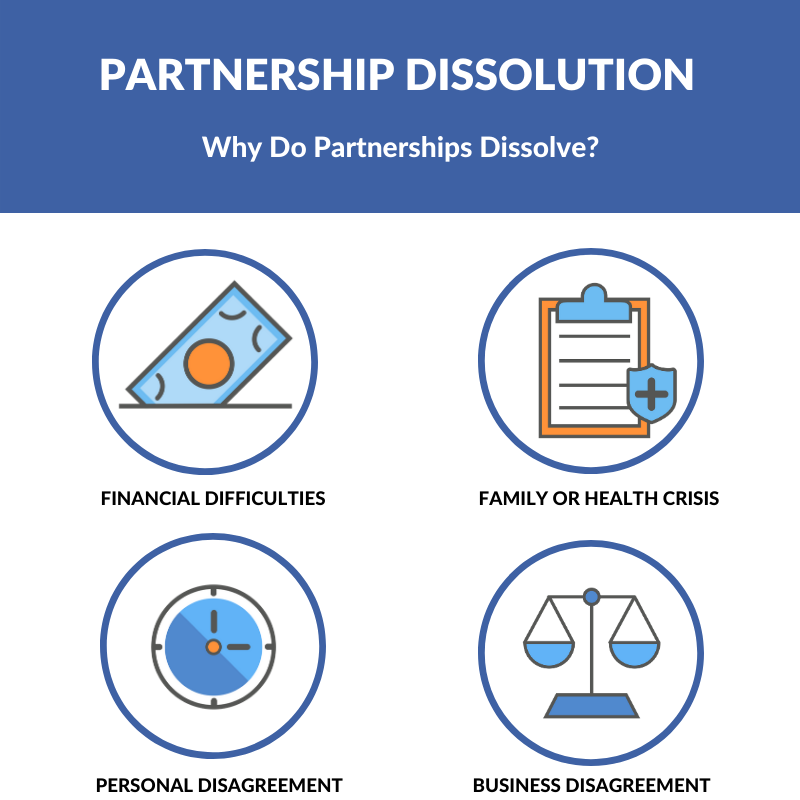If you started a business as a partnership, both partners probably had high hopes and big dreams. You might have been imagining making it big, or at least doing something that you loved with your life.
Sometimes, those hopes and dreams don’t quite work out … or at least not the way you’d both envisioned.
Whatever the exact scenario, you might come to the point where you want to end the partnership. You want to be able to do this as amicably as possible, and in a way that ties up any legal and financial loose ends.
Here’s what you need to know about partnership dissolution:
You’ll need to do some form-filling
A “Dissolution of Partnership deed” or “Partnership Dissolution agreement” is an important legal document that you should use to help you and your partner(s) end the partnership fairly and transparently. It should include information such as:
- The date when the partnership will cease trading (be dissolved).
- How the partnership will be wound up.
- What the partners can and can’t do between the dissolution date and the point at which the partnership is wound up.
- Information about how assets will be distributed (these assets might be financial, but they could also be equipment or even client lists).
- How the final accounts for the partnership will be prepared and approved.
- What records will be retained.
There are partnership dissolution agreement forms that you can use as templates.
It can be fairly straightforward…
In a very straightforward scenario, you might have a single business partner and you might both be in agreement that you want to dissolve your partnership—perhaps you’re both moving on to new ventures or even retiring.
So long as your business doesn’t have outstanding debts, then dissolving the partnership should be simple and straightforward.
…Or it can be more complicated
In most cases, dissolving a partnership is rather more complex. This could be because:
- There are multiple partners involved, potentially with quite different opinions on how best to proceed.
- One partner wants to leave, but the other wants to keep running the business.
- The partners have fallen out and are blaming one another for the failure of the business.
- The business is in debt (e.g. to suppliers).
- One partner has died or gone bankrupt (in which case the partnership normally has to be dissolved).
If you’re in a complex or acrimonious situation or one where a lot of money is involved, then it’s always best to seek specialist legal advice.
Avoiding partnership dissolution
Of course, the best scenario is to avoid having to dissolve a partnership altogether – or at least ensuring that if you do end up needing to do so, you and your partner(s) are prepared for the possibility ahead of time.
Before you structure your business, it’s crucial to weigh partnership pros and cons. Partnerships can be great for some business models but not for others; they may also suit some personality types but not others.
If you do go ahead with a partnership, make sure you have a partnership agreement in place from the outset that outlines each partner’s responsibilities, the decision-making process, how profits (and losses) will be divided, and how partnership changes will be handled.
If your business partner wants to leave but you want to keep the business going, it may be possible for you to buy them out—it’s certainly worth exploring this option, especially if you’re in the early stages of the business and it wouldn’t cost much for you to do so.
Why do partnerships dissolve?
There are all sorts of reasons why business partnerships get dissolved, including:
- One partner runs into personal financial difficulties, potentially meaning that they need to leave the business if it’s not (yet) paying them a full-time salary.
- One partner has a family or health crisis. If your business partner becomes unwell or needs to care for a family member, they may not feel they can keep up with the demands of the business anymore.
- Two (or more) partners have a personal disagreement. As with marriages, business partnerships sometimes end because two people just can’t get along. Going into business with a friend might sound like a great thing to do, but business pressures can put real strain on that friendship.
- Two (or more) partners have a business disagreement. You might get along fine with your business partner(s), but perhaps you have an increasingly different vision in mind for how the business should develop. Maybe you want to hire your first employee, for instance, but your partner doesn’t agree.

Ultimately, partnership dissolution doesn’t need to be messy or complicated. If you have a clear partnership agreement in place at the start, and you and your partner(s) carry on communicating and compromising well with one another throughout the process, you can move on from your partnership to your next venture with a minimum of trouble and expense.
These views are made solely by the author.



